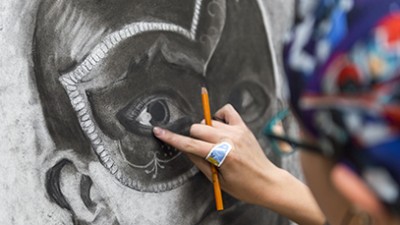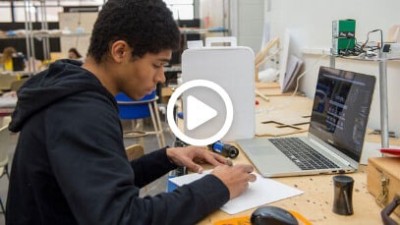
Kristy Boyce
Assistant Professor
School of Photographic Arts and Sciences
College of Art and Design
Kristy Boyce
Assistant Professor
School of Photographic Arts and Sciences
College of Art and Design
Currently Teaching
PHAP-302
Advertising Photography II
3 Credits
Building on the content delivered in Advertising Photography I, Advertising Photography II will introduce business aspects involved in commercial photography. Students will create self-promotion materials as well as a resume/cover letter. A cohesive portfolio is required at the end of the course. Students will also work on a group project, introducing them to the collaborative nature of the advertising business. Assignments will emphasize conceptual over technical solutions.
PHAP-308
Location Photography
3 Credits
The course will cover the technical and aesthetic decisions necessary to produce successful photographs on location for both advertising and editorial usage. Students will be encouraged to develop a consistent personal style and maintain rigorous technical photographic standards. Students will explore a variety of subject matter while photographing on location. A final portfolio will be required for the course.
PHAP-327
Fashion Photography
3 Credits
This course will introduce students to fashion photography and will look at fashion from a broad imaging perspective. There will be instruction on lighting, styling, and directing a fashion image, as well as developing concepts for photo shoots. Casting, studio and location practices, ethics, and the history of fashion photography will be addressed. Retouching of fashion photographs will be demonstrated.
PHAP-337
Production Photography
3 Credits
This course will introduce the storytelling side of professional photographic illustration. Assignments for this course will include recreating historical events, inventing futuristic scenes, and creating believable period pieces with an emphasis on visual narratives. Students will be introduced to project planning, concept development, scheduling, budgeting, casting, auditions, advanced lighting techniques, comprehensive preparation for large production, project management and post-production treatments. Students work on production teams to address large-scale photographic projects.
PHAP-416
New York City Advertising Photography Field Trip
3 Credits
This course offers photography students a unique opportunity to participate in a one-week intensive workshop that travels to New York City, a center of the advertising photography industry. Through this field trip and accompanying lectures and studio visits, students will experience the field of professional photography and related industries in New York City. The trip provides a broad view of advertising and editorial photography within the city, highlighting diverse and mainstream voices in the industry. Students meet with a variety of photographers, art directors, designers, filmmakers, photo editors, photographer agents, assistants, and RIT alumni. Students will also visit photography studios, advertising agencies, graphic design studios, magazines, galleries, and museums, ensuring comprehensive exposure to well-established and emerging myriad talents in the field. **Fee: A course fee applied via student account**
PHAR-160
Intro to Digital Photography
3 Credits
An introduction to digital photography – technical, aesthetic, conceptual – for non-photography majors. Through weekly assignments, students will become familiar with the operation of a DSLR camera body/lens, while exploring the basic principles of lighting, depth of field, design, blur/stop motion, accurate exposure, and image manipulation. Lectures will address photographic aesthetics, contemporary and historical practices, and professional applications. Students will learn to critique work through participation in discussions of photographic assignments. Students are required to have their own DSLR (digital single-lens reflex) camera. Non-photo majors only. **A materials fee is required for this course and an additional facilities fee for non-SPAS students**
PHAR-302
Advanced Video for Photographers
3 Credits
This course will introduce students to advanced techniques & best practices for storytelling through moving media. Production processes will be covered in areas such as scriptwriting, storyboarding, cinematography, camera movements, roles on set, lighting, audio, greenscreen, color correction, & multi-camera editing. The course will also explore the use of new & emerging technologies through “digital experiments”, projects, and in class assignments. Students will consider work by contemporary media creators as they plan and execute their own video projects. Upon completion of the course, students will have a deeper understanding of the skills necessary to create their own professional level video projects.
Featured Work
Ish X JLB
Anna Rhody & Will Paturzo
Advanced Video for Photographers (PHAR-241) taught by Kristy Boyce




